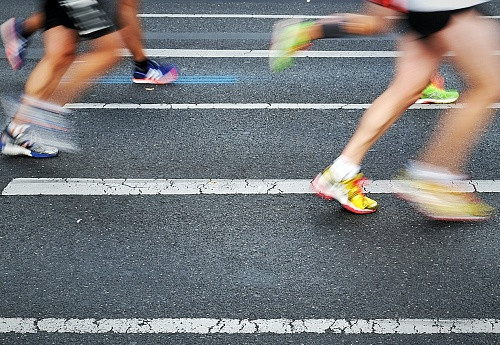Is it possible to run a marathon under two hours? Nike thinks so
Nike has put together a project to make three athletes succeed in running a marathon under two hours.

Succeeding in running a marathon in under two hours is a record most athletes would like to break, but it is a feat that remains elusive, even for seasoned runners. An initiative known as Breaking2 has decided take on the challenge by offering a specific training to three high-profile marathon runners.
To date, the world record remains that set by Kenyan Dennis Kinetto, who ran the 2014 Berlin marathon in 2h 2min and 57 sec.
Organised by Nike, the Breaking2 project involves bringing together people from different disciplines – such as coaches, sport psychologists, engineers, nutritionists or doctors – to improve athletic and psychological abilities of runners.
Some experts involved with the project also study the influence of the environment and the climate on performances.
The three runners enrolled in the project are Eliud Kipchoge of Kenya, Lelisa Desisa of Ethiopia and Zersenay Tadese of Eritrea. All are elite runners who typically get impressive results when they run marathons. Zersenay Tadese set a world's half-marathon record in 2010, completing the race in 58 min and 23 sec, while Lelisa Desisa is famous for having won the deadly 2013 Boston Marathon.
The date and location of the sub two-hour race attempt by the Breaking2 are not known yet. These details will be revealed next year.
Is it really possible to run a marathon under two hours?
To succeed, the Breaking2 athletes will have to reach a pace of four minutes and 34 sec per mile. This is in theory possible – in 1954, Sir Roger Bannister ran the first four-minute mile, redefining what athletes are capable of.
However, some scientists believe that running a marathon under two hours may be physiologically impossible – at least, it won't happen in this generation. They argue that future runners might be stronger and have more endurance, and so in two decades the record will be broken. However, this will take time.
Broadly speaking, three factors influence how fast someone can run for a long period of time: the maximum rate of oxygen they consume, how quickly they cover ground and their endurance capability. Only athletes in top shape can hope to improve on these factors and break the record.
How much they are paid may also improve runners' performance, by providing an incentive to run under two hours. In the context of the Breaking2 project, the three runners will potentially be rewarded with a lucrative bonus if they succeed.
© Copyright IBTimes 2025. All rights reserved.






















